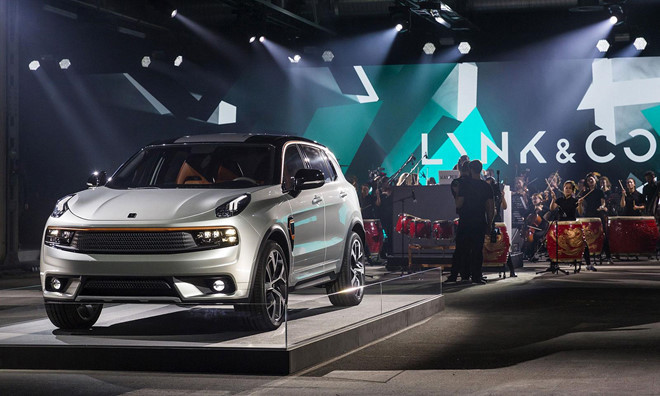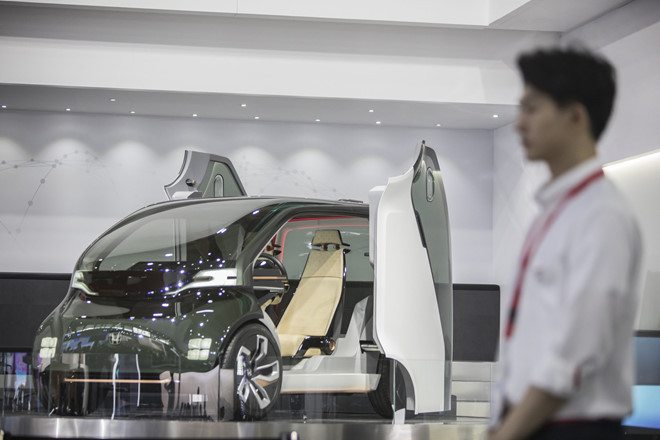China aims to become an electric vehicle hub
China requires major global automakers to share electric vehicle technology if they want to do business in the country.
Volkswagen, the auto giant, is preparing to ramp up production of electric cars next year, marking China as a key market. Volkswagen’s decision is not contrary to the trend. General Motors has chosen China as the location for its electric vehicle research and development center. Also here, Renault-Nissan and Ford are rushing to establish a joint venture on the vehicle considered the future of urban transportation.
Automakers see a bright future for electric vehicles, with the greatest potential in China. They are moving key research and design centers to China, as the country invests heavily in charging stations and research, encouraging automakers to develop battery-powered vehicles.
 |
| Lynk & Co - China's emerging electric car manufacturer. |
Last weekend, the world's most populous country highlighted and emphasized its ambition to develop electric vehicles, and announced a ban on gasoline and diesel cars in the future, although the exact timing has not been determined.
But history shows that moving the electric vehicle design and production center to China poses a big risk.
From high-speed trains to wind turbines, China has long forced American, European and Japanese companies to transfer technology in exchange for access to the world’s most populous market. Domestic companies then use the transferred technology, along with government support, to compete against foreign rivals.
Likewise, China wants foreign manufacturers to share their electric vehicle expertise and technology. Otherwise, foreign manufacturers face intense government pressure. Senior Chinese officials have imposed strict regulations forcing automakers like Volkswagen and GM to sell new-energy vehicles domestically if they want to continue selling gasoline and diesel vehicles.
Western automakers, however, have their own calculations. They know the risks, but the rewards are many opportunities that help them achieve their electric vehicle ambitions more quickly.
“We are learning from each other,” said Jochem Heizmann, CEO of Volkswagen China. “This helps us grow faster than before.”
Under a plan known as “Made in China 2025,” China aims to become a dominant player in several new future technologies, such as artificial intelligence and robotics. Chinese officials say promoting these industries will help the Chinese economy grow and make it less dependent on foreign technology, a dependence that could lead to information leaks and national security risks.
“Many multinational companies are beginning to respond to China’s policies, endangering the industry, in addition to the loss of countless jobs and economic benefits,” said Michael Wessel, Commissioner of the US Economic and Security Review Commission.
 |
| Honda introduces the NeuV electric vehicle concept at the Shanghai Consumer Expo. Photo: Bloomberg. |
"We don't have any concerns regarding intellectual property rights," said Matt Tsien, GM's president in China.
GM has partnered with Shanghai Automotive Industry Corporation to bring to the Chinese market the Chevrolet Volt and Buick Velite, two hybrid cars that run on both gasoline and electricity.
“We have a philosophy that we manufacture cars where we sell them,” said Mr. Tsien.
Ford, meanwhile, has said only that it will comply with all Chinese government joint venture rules, and that its partnership with Zotye Auto is just a start. Renault-Nissan said its joint venture with Dongfeng, called eGT, will produce a new all-electric vehicle, to be built at Dongfeng's plant in the city of Shiyan, China. Honda also plans to build an electric vehicle there next year, and Toyota plans to build a plug-in hybrid.
Joint ventures won’t make China a leader in electric vehicles. GM, Volkswagen, and others have shared technology with Chinese partners on conventional vehicles for decades, and the government has hoped that domestic automakers could make a mark on their own, but haven’t. But China isn’t giving up.
Gao Feng Advisory, a Beijing-based consultancy, estimates that China will spend about $15 billion in 2020 on installing charging stations for electric vehicles. The country has already spent more than $1 billion on research and development so far, and that figure is expected to rise in the future.
 |
| Global electric vehicle sales researched and forecasted by LMC Automotive. |
LMC Automotive, a global consultancy, estimates that battery-powered vehicle sales in China could reach more than 400,000 units in 2018, accounting for two-fifths of global sales of this type of vehicle.
Overall, major automakers see opportunity in the world's largest auto market in the future, which could be as large as the US and Europe combined.
Executives say they have no choice but to take risks to tap into the potential Chinese market. At the Shanghai auto show last spring, more than 190 different electric vehicles were on display, though most of them were concepts.
"We will increase investment, and we are not at all concerned about technology transfer risks," said Hubertus Troskam, president and CEO of Daimler in China. "China is the most exciting and attractive market in the world today."
According to Zing
| RELATED NEWS |
|---|
